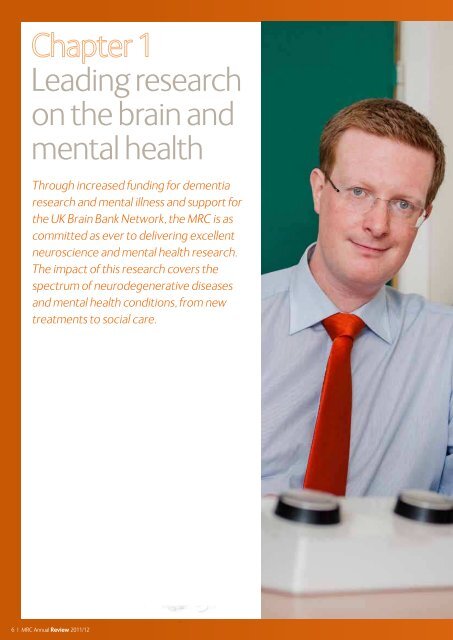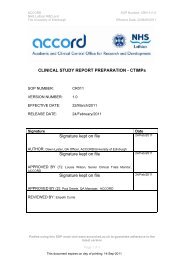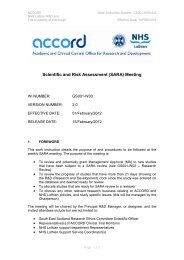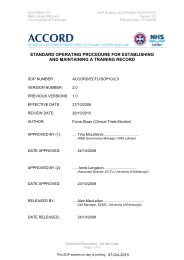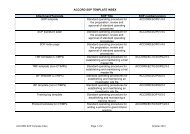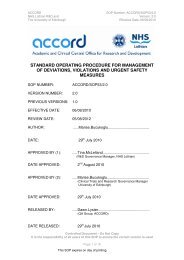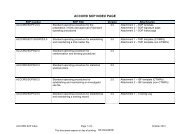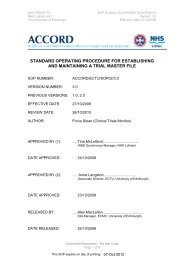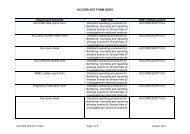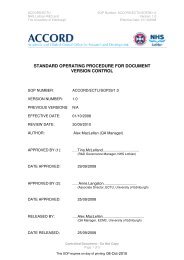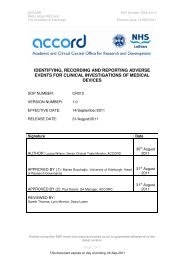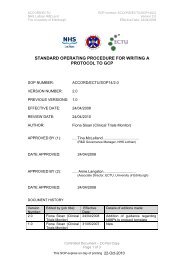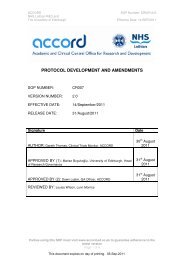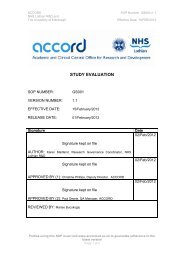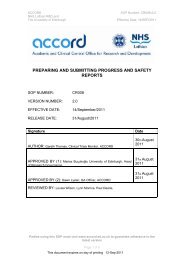Advancing medicine, changing lives - Medical Research Council
Advancing medicine, changing lives - Medical Research Council
Advancing medicine, changing lives - Medical Research Council
Create successful ePaper yourself
Turn your PDF publications into a flip-book with our unique Google optimized e-Paper software.
PROFILE: Professor Alasdair MacLullich, University of Edinburgh<br />
Leading research<br />
on the brain and<br />
mental health<br />
Through increased funding for dementia<br />
research and mental illness and support for<br />
the UK Brain Bank Network, the MRC is as<br />
committed as ever to delivering excellent<br />
neuroscience and mental health research.<br />
The impact of this research covers the<br />
spectrum of neurodegenerative diseases<br />
and mental health conditions, from new<br />
treatments to social care.<br />
With its grey plastic case and chunky buttons, the device<br />
on the table in front of Professor Alasdair MacLullich<br />
looks like something from a 1980s episode of Tomorrow’s<br />
World. Affectionately known as the ‘Delbox’, this is the<br />
first computerised test specifically designed for detecting<br />
delirium. To the uninitiated, the word delirium might sound<br />
like a Victorian malady; a disease confined to history books.<br />
But it’s a common modern-day problem and a major risk<br />
factor for dementia and death in the elderly. New ways of<br />
detecting and treating the condition are urgently needed.<br />
Alasdair is a professor of geriatric <strong>medicine</strong>. His interest in<br />
this area was sparked during his PhD, which looked at the<br />
link between stress hormones and cognitive impairment<br />
in the elderly. More recently, an opportunity for further<br />
research came along when Alasdair was awarded an MRC<br />
Clinician Scientist Fellowship.<br />
“That was when I really changed tack to start doing delirium<br />
research. As a clinician I’d noticed that delirium was a<br />
problem, it was very common and yet it had hardly been<br />
touched by research – and I was lucky enough get an MRC<br />
fellowship to investigate it,” he says.<br />
Having time away from being a busy hospital doctor<br />
allowed Alasdair the thinking space to come up with ways<br />
to understand and measure delirium, and to distinguish<br />
patients with delirium from those with dementia. He homed<br />
in on the fact that delirium sufferers cannot focus their<br />
attention for more than a few seconds, whereas a dementia<br />
patient usually can, even if brain functions such as memory<br />
are severely impaired.<br />
Alasdair enlisted the help of a toy maker and electronic<br />
engineer to make a prototype Edinburgh Delirium Test<br />
Box, or Delbox.<br />
The device is a simple box with two buttons (taken from<br />
a fruit machine) which flash on and off. The researcher<br />
sets the number of flashes and the timing between them<br />
and the patient is asked to count the number of flashes.<br />
Alasdair and colleagues deliberately made the design<br />
‘retro’ in appearance so that it would feel more familiar and<br />
acceptable to the elderly patients being tested.<br />
“It’s still got a ‘workshop in the back garden’ appearance to<br />
it,” says Alasdair. “It’s funny because I also work in the labs<br />
at the Queen’s <strong>Medical</strong> <strong>Research</strong> Institute where people<br />
do very sophisticated things like genome-wide association<br />
studies. When they see my device they’re sort of thinking<br />
so….is this it?<br />
“But I think we have to fit our science to the problem here,<br />
not to some kind of spuriously sophisticated concept. Can<br />
delirium patients count the number of flashes or not? No<br />
they can’t. Can people with dementia do it? Generally, yes.”<br />
Delirium affects around one in eight hospital patients, but<br />
it’s most common in older people. It can come on within<br />
hours or days after surgery or infection, or as a result of<br />
drug side-effects, and lasts for anything from hours to<br />
several months.<br />
Alasdair explains: “Delirium’s a serious problem.<br />
That’s not just because it affects outcomes like death,<br />
institutionalisation and length of hospital stay – which<br />
obviously carry an economic burden – but also because<br />
it’s very distressing for the patient.<br />
“They can have vivid, horrible hallucinations. I treated one<br />
lady who thought she was tiny and that people around her<br />
were giants. Others see blood coming out of the walls or<br />
crocodiles swimming around their beds. There’s actually<br />
evidence that people get post-traumatic stress<br />
disorder afterwards.”<br />
Soberingly, there’s also emerging evidence that delirium is<br />
associated with an eight-fold risk of developing dementia<br />
in the future, a raised risk of losing the ability to live<br />
independently and increased risk of death.<br />
“These patients are actually getting brain injury – which<br />
is quite a stark and alarming concept. The scale of it is so<br />
enormous that the research community is talking about this<br />
being important for secondary or even primary prevention<br />
of dementia. So if we can get a hold of what delirium is,<br />
detect it and then use this to improve patient care, we<br />
might even be able to prevent some cases of dementia.”<br />
A critical step towards this goal will be to improve<br />
measurement of delirium, so the Delbox has attracted<br />
interest from delirium researchers worldwide. Ultimately the<br />
device could help to improve clinical detection of delirium;<br />
presently only 20 per cent of cases are picked up. With the<br />
help of an MRC Development Pathway Funding Scheme<br />
grant, and support from the University of Edinburgh,<br />
Alasdair is working on further prototypes and getting them<br />
commercialised. Plans are afoot to develop a software<br />
version of the test which could be downloaded to a<br />
PC or iPad.<br />
“I see the value of using the business route to get money in<br />
to help fund research,” says Alasdair. “I want to be involved<br />
in problem solving, getting it out there and helping people<br />
to use the device if they want to. If it makes money I’ll be<br />
happy with that – it’s good for the university and good for<br />
our country.”<br />
6 | MRC Annual Review 2011/12 MRC Annual Review 2011/12 | 7


